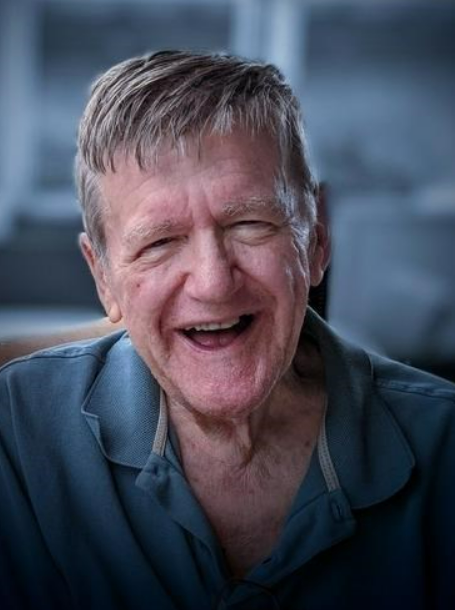Walter Young MacDonald, 81, of Waterville, OH, died May 28, 2023 in Hospice of Northwest Ohio, his wife, Lea Anne Metzger MacDonald, at his side, 15 years after a diagnosis of Parkinson’s disease. He made the most of that time, bringing a lifetime of experience as a social worker, psychologist, and Episcopal priest to bear on his changing circumstances; finding a new, loving, extended family; and parceling out what remained of a seemingly endless store of energy and curiosity.
He was born in Boston, MA on June 10, 1941, the fifth of 6 children born to Marian S. Young and Herman Albin MacDonald, former mayor of Beverly, MA and Commissioner of Public Works for the state of Massachusetts in the 1940s. A hard-won rise to a life of political power and privilege meant that Herman was mostly absent from the life of his family, and his wife and children were left to handle that however they could. For Walt as a young boy, the household atmosphere was hushed and stifling: emotions went unexpressed, questions unanswered. “Our home in Marblehead Neck was in black-out during the war and everything was closed up on the ocean side of the house. The same could be said of us.” Letting the light back in, for himself and others, would become a guiding principle in Walt’s life.
He earned a bachelor’s degree in History from Davidson College in 1964. Inspired by the school’s liberal world view and eager to help those most in need, he worked after graduation in the nearby Charlotte, NC ghetto in an anti-poverty program advocating for fair housing, food distribution, and affordable medical care. He met individually with community members, searching out solutions to the intractable problems they faced, but soon saw that social remedies went only so far. What he loved doing, and thought most useful, was talking and listening to people on a deeper level, surfacing their problems, and working those out while honing his own perceptual skills.
He moved on to Cambridge, MA, enrolling in the Episcopal/Harvard Divinity School to train for the priesthood (Master of Divinity, 1969). Known for progressive teaching and action on issues of civil rights and social justice along with field training, the school helped him shake off a little more of his upbringing and engage on a spiritual level with a less privileged community. At the same time, he began postgraduate work in Social Relations and Psychology at Harvard, where he enrolled in clinical pastoral training at Massachusetts General Hospital, counseling patients on death and dying. Noting that the hospital environment at that time was quite buttoned-up on the topic, he recounted going to visit one of his patients but finding an empty room. No one would say “dead.” He was instructed instead to follow the blue line. It ended at the morgue, and his deceased patient. It echoed a moment from his childhood, when he asked a policeman and neighbors shielding from his view a lifeless body on the beach: “Dead? What is dead?” No one would say. He was 5 years old. Breaking through the social constraints and taboos that rendered that word–and others like it–too fraught to say became a central principle of his converging ministry, counseling, and social work.
He finally landed at the School of Social Work, University of Michigan, Ann Arbor (Master of Social Work, 1972) to train for certified private practice in social services and psychology. That led to a career he carried out with exuberance and stamina for the next 40 years. He was an adherent of the approach of Milton Erickson, psychotherapist, who, unlike Freud, believed that the unconscious was a positive force–a reservoir of creative potential that could be tapped to solve practical problems. It was the perfect corrective to Walt’s early work in the Charlotte ghetto, where the available solutions left out fundamental psychological and spiritual needs. “You know more than you think you know,” Dr. Erickson would say, as he devised impromptu ways of exposing and utilizing his patients’ own knowledge and intuition to improve their spiritual, mental, and social health. For Walt and his mentor, being alive in the moment, breaking rigid habits and patterns, questioning social conventions, exposing “forbidden” words and ideas to the light of day–all were part of the process.
And all were intricately woven into Walt’s daily life. He was the best listener you would ever meet, engaging anyone who might cross his path on a given day, offering surprising insights and new perspectives. The world was his office, even though it might be only a local diner or museum or sidewalk. He was an absolutely unstoppable force when it came to his ever-evolving hobbies/passions/interests, of which he had many: collecting early photography masters, travelling, designing landscapes, writing poetry. All of this he eagerly shared, with unabashed disregard for his increasing physical limitations, always in pursuit of his next adventure–unfolding just now.
Survivors include his companion and wife of the last 9 years, Lea Anne Metzger MacDonald, of Waterville, OH; his son, Ian Erickson MacDonald (Julie), Kalamazoo, MI, from a previous marriage to Paula Kern Brant MacDonald, Ann Arbor, MI; stepchildren, Michael Metzger (Felicia), Toledo, OH, Julia Serve (Bob), Sylvania, OH, Dianne Hamizadeh (Farid) and Mary Jo Connelly (David), Waterville, OH; 13 step- grandchildren; 3 step-great-grandchildren; a sister, Carol Glenn; and a brother, Karl “Bill” MacDonald. His parents, Herman and Marion Young MacDonald; brothers, Herman Jr. “Mac” and David MacDonald; and sister, Louise Moncrief, died earlier.
Funeral services will be held August 17, 2023, 11 a.m., at St. Michael’s in the Hills Episcopal Church, 4718 Brittany Road, Ottawa Hills, OH 43615, with burial in their Memorial Garden. Contributions in memory of Walt may be made to Hospice of Northwest Ohio, 800 S. Detroit Ave., Toledo, OH 43609.

Davidson College – In Memoriam
Davidson College Alumni & Friends Obituaries
